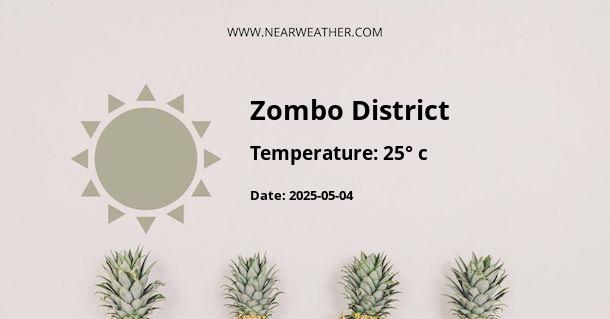Zombo District, Uganda: Climate and Weather Overview
Zombo District, located in the northern part of Uganda, experiences a unique climate and weather patterns that significantly impact the lives of its inhabitants. Understanding the climate of Zombo District is crucial for agriculture, infrastructure planning, and overall preparedness for extreme weather events. In this detailed overview, we will explore the climate, weather patterns, and seasonal variations in Zombo District, Uganda.
Climate of Zombo District
Zombo District falls within the tropical savanna climate zone, characterized by distinct wet and dry seasons. The district experiences relatively consistent temperatures throughout the year, with the influence of the Inter-Tropical Convergence Zone (ITCZ) and the movement of the Intertropical Convergence Front (ITCF) impacting rainfall patterns.
The district's proximity to the equator contributes to its warm temperatures, with minimal variation between seasons. The average annual temperature in Zombo District hovers around 25 to 28 degrees Celsius, providing relatively stable and warm conditions for much of the year.
Rainfall Patterns
One of the defining features of Zombo District's climate is its distinct wet and dry seasons. The region experiences two primary rainy seasons:
- Primary Rainy Season: The primary rainy season occurs from April to June, with peak rainfall in May. This period is crucial for agricultural activities, as the abundant rainfall supports crop growth and sustains local livelihoods.
- Secondary Rainy Season: Zombo District experiences a secondary rainy season from September to November. While the rainfall during this period is generally lower than the primary rainy season, it still plays a vital role in supporting agricultural activities and replenishing water sources.
Conversely, the district experiences two distinct dry seasons:
- First Dry Season: The first dry season typically extends from December to February, with relatively lower rainfall and drier conditions prevailing across the district.
- Second Dry Season: Zombo District experiences a shorter dry season from July to August, characterized by reduced rainfall and drier weather patterns.
Weather Variability and Extreme Events
While Zombo District generally exhibits consistent climate and weather patterns, the region is not immune to weather variability and occasional extreme events. The district may experience occasional heavy rainfall, thunderstorms, and strong winds, particularly during the rainy seasons.
Furthermore, the impacts of climate change have the potential to introduce greater variability and unpredictability in the district's weather patterns, necessitating proactive measures for climate resilience and disaster preparedness.
Seasonal Climate Summary
The following table provides a summary of the seasonal variations in Zombo District, highlighting the average temperatures and precipitation levels during each season:
| Season | Average Temperature (°C) | Precipitation Levels |
|---|---|---|
| Primary Rainy Season (April - June) | 25-28 | High, peak rainfall in May |
| First Dry Season (December - February) | 25-28 | Low, reduced rainfall |
| Secondary Rainy Season (September - November) | 25-28 | Moderate, supports agricultural activities |
| Second Dry Season (July - August) | 25-28 | Low, drier weather patterns |
Impact on Agriculture and Livelihoods
The distinct climate and weather patterns in Zombo District play a pivotal role in shaping the region's agricultural activities and livelihoods. The primary and secondary rainy seasons provide critical moisture for crop cultivation, enabling the production of staple crops such as maize, cassava, and beans, which form the backbone of the local agricultural economy.
Conversely, the dry seasons present challenges for agriculture, necessitating water conservation measures and appropriate crop selection to cope with reduced rainfall and water availability.
Conclusion
Zombo District's climate and weather exhibit a clear seasonal pattern, with distinct wet and dry seasons impacting the region's agricultural activities and overall livelihoods. Understanding the climate and weather characteristics is essential for sustainable development, disaster risk reduction, and climate adaptation strategies in the district.
By recognizing the nuances of Zombo District's climate, stakeholders can implement tailored interventions to support agricultural resilience, water resource management, and community well-being, thereby fostering a more sustainable and climate-resilient future for the region.
A - Zombo District's Latitude is 2.520310 & Longitude is 30.888241.
A - Weather in Zombo District is 16° today.
A - Climate Conditions in Zombo District shows clear sky today.
A - Humidity in Zombo District is 45% today.
A - Wind speed in Zombo District is 4.39 km/h, flowing at 178° wind direction. today.
